MirandaNet’s work across Europe with HandsOn ICT MOOCs.
Abstract
MirandaNet has been working with HandsOn ICT to develop, implement and disseminate new knowledge about MOOCs (Massive Open Online Courses) with groups across Europe. Sixteen academics from Czech Republic, Holland, Finland, UK and Denmark came together to plan an EU Erasmus Plus submission for April 2015 that would include the use of the HandsOn ICT MOOC, Learning Designer and Ingots accreditation. The UK team was Sarah Younie, Christina Preston, Patricia Charlton, Ian Lynch and Theo Kuechel.
You can read the full blog here.
Extracts from the blog are published below
[s2If !is_user_logged_in()]More… To see the complete Case Study, please Login or Join.[/s2If]
[divide margin_top=”10″ margin_bottom=”10″ color=”#a0a0a0″]
[s2If is_user_logged_in()]
[one_third]
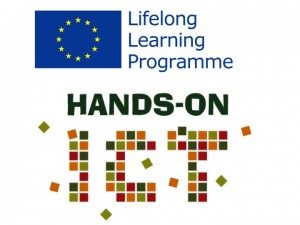
HandsOn ICT Project
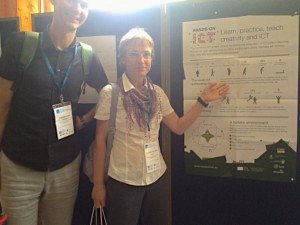
Vik and Ben in Slovenia
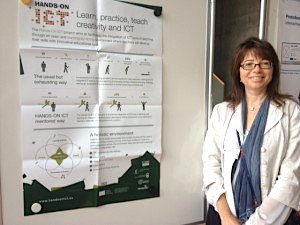
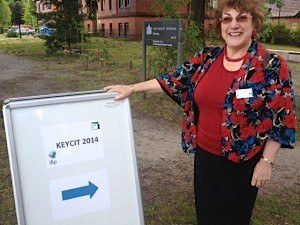
Christina in Germany
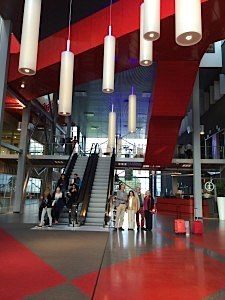
MOOCs in the Netherlands
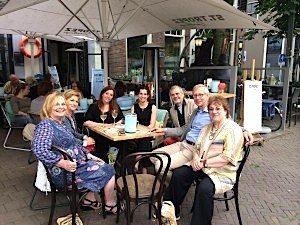
MOOCs in the Netherlands
[/one_third]
[two_third_last]
Planning for Sustainability in Deventer, Holland
The purpose of this workshop with sixteen academics from Czech Republic, Holland, Finland, UK and Denmark was to plan an EU Erasmus Plus submission for April 2015 that would include the use of the HandsOn ICT MOOC, Learning Designer and Ingots accreditation.
The project plan involves a focus on STEM topics: the T is for digital technology in teaching and learning – often called Information and Communications Technology(ICT) in Europe.
So far the ideas focus around an adaptive program for effectively enhancing pre-and in-service teachers’ competencies pertaining to STEM teaching in primary and secondary education that will be developed and evaluated.
The adaptive approach involves that the amount of support that a teacher needs for learning to use the effective science teaching strategy, is matched with the complexity of using that particular strategy in his/her classroom that includes a focus on ICT where the HandsOn Mooc will be vital. To start and early relationship with HandsOn ICT the academics were willing to find more participants and facilitators for pilot three that starts in October 2014. At the next meeting in Brighton, UK in September the academics will be developing the Erasmus submission by asking these questions:
- What proof do we already have about the value of video based professional development that we can build on?
- How can we strengthen the role and place of video-mediated reflection and feedback in the foreseen adaptive teacher-training program for enhancing STEM education in European primary and secondary schools?
- How can we improve the operationalization of the proposed adaptive program by working with prospective partners like EU Handson ICT, Learning Designer and Ingots? Are there other partners we should consider
- Do you have ideas for enhancing the international dimension (enhancing entrepreneurship, reindustrialization of Europe, relevance and need for conducting this project?
Exploring dissemination, networking and sustainability with HandsOn ICT Partners
Dr Sarah Younie and Professor Christina Preston, from the MirandaNet HandsOn ICT team have been presenting aspects of the programme at three conferences. At each they presented a paper and held a poster session. At Potsdam a committee meeting for IFIP 3.3. was also an opportunity to present the HandsOn project and invite the 40 members to participate in pilot three.
The papers can are here in draft form and will be published in the conference proceedings:
- MakeLearn 2014 submission – Portoroz, Slovenia, June 27th
- Moodle Moot – Korper, Slovenia June 28th
- KEYCIT2014 – July 1-4 Potsdamn, Germany
The purpose of these visits were:
- to disseminate the current findings from the HandsOn ICT project;
- to network with educators and students who might want to join the third MOOC pilot;
- to find education institutions who would wish to engage with further developments when the funding ends;
- to negotiate with potential company associates who have services to offer to HandsOn ICT.
Make Learn Conference – disseminating new knowledge about MOOCs
Research into the LLL EU HandsOn ICT MOOC was disseminated at the MakeLearn conference, Human Capital without Borders: Knowledge and Learning for Quality of Life, where there were nearly 200 delegates from all over the world.
This conference was particularly relevant to the HandsOn ICT team because the pedagogy underpinning the MOOC is learner-centred, open-source and encourages collaborative knowledge sharing and peer review.
At this conference Sarah and Christina focused on the topic of sustainability:
When the Funding Ends: Using the Handson ICT MOOC as a Key Element in Research and Development Projects Funded by the EU ICT Industry.
This stimulated an interesting discussion with the audience of 20 participants as many of the other educators face the issues of finding an adequate business plan that carries the project forward.
MoodleMoot
The presentation, at the MoodleMoot on 27th June was attended by 34 Slovenian Moodle experts where Sarah and Christina talked about: From a community of practice perspective learning in a MOOC can be a lonely business.
The Slovenian hosts also ran a streamed MirandaMod so that international speakers from the HandsOn ICT team and associates could be speak who could not attend in person:
- Carles Fernandez, EU LLL HandsOn ICT, Universitat Oberta de Catalunya, Barcelona, Spain presented Moodle as a MOOC environment to train teachers on Learning Design methodologies
- Ian Lynch, EU LLL HandsOn ICT Ingots, presented MOOC Assessment
- Patricia Charlton, London Knowledge Lab, Institute of Education EU LLL HandsOn ICT associate, presented Designing Active Learning in Moodle – a preview of the Learning Designer tools.
Mentoring in a Digital World
Mentoring in a Digital World: what are the issues?, funded by the EU LLL HandsOn ICT project was at Key Competencies in Informatics and ICT (KEYCIT 2014) July 1-4 conference in Potsdam where there were more than 100 international academics addressing the challenges of a rapidly changing world.
“It is increasingly important not only to be an expert in your chosen field of study but also to be able to respond to developments, master new approaches to solving problems, and fulfil changing requirements in the modern world and in the job market. In response to these needs key competencies in understanding, developing and using new digital technologies are being brought into focus in school and university programmes.”
The conference is organized into strands focusing on secondary education, university education and teacher education that relate to the HandsOn ICT target cohorts.
Networking
There were 200 delegates at MakeLearn, 34 at the MoodleMoot and 100 plus international delegates at the IFIP conference who were invited to join in the third pilot of HandsON ICT in the presentations and in the three HandsOn ICT poster sessions.
Leaflets were distributed and conference delegates were invited to join the MOOC SIG set up by MirandaNet for HandsOn ICT. A presentation was also given to the IFIP 3.3 committee and Sarah and Christina were invited into the committee Ning so that they can send more information about HandsOn ICT second pilot.
Other connections were made for the HandsOn ICT team who were also invited to set up a streamed international symposium on MOOCS in the next MakeLearn conference in Bari, Italy in May 2015. In addition, Dr Sarah Younie has also been elected onto the MakeLearn journal editors’ panel that aims to bring leading international editors together to share their ideas about selection criteria for potential publication.
Sustainability
The Younie and Preston paper about the sustainability of MOOCs called When the funds ends: using the HandsOn ICT MOOC as a key element in research and development funded by the EU ICT Industry covered the ways in which an EU project can be sustained when the funding has finished. The topics included: building a resource for teachers; publishing the associated research globally; and, accreditation.
The authors of the paper who are leading the sustainability aspects of this EU project also described how they were bringing in companies as associates: for example LightSpeed providing microphones; a company perspective on the evaluation of the MOOC and suggestions for the software development from Frog.
[/two_third_last]
[divide margin_top=”10″ margin_bottom=”10″ color=”#a0a0a0″]
References & Contacts
HandsOn ICT
MakeLearn 2014 submission
Moodle Moot
KEYCIT2014
LightSpeed
Frog
[divide margin_top=”10″ margin_bottom=”10″ color=”#a0a0a0″]
[review]
[/s2If]
